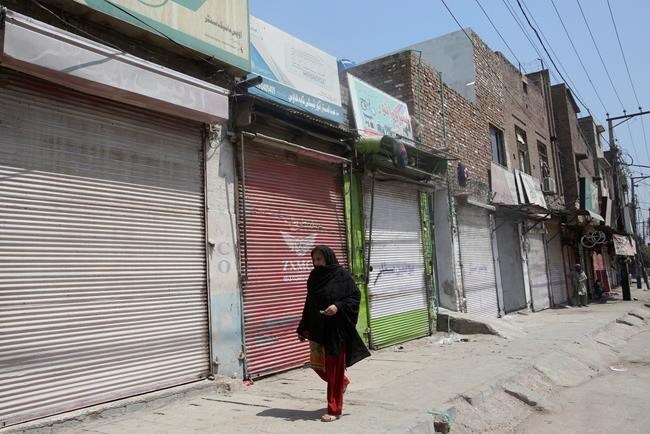
A woman walks past shops that are closed due to an escalation of cases of the coronavirus in Peshawar, Pakistan, Wednesday, June 17, 2020. Authorities sealed many areas in different cities on the advice of the Health Department and epidemiologists after hundreds of cases of the virus were reported. (AP Photo/Muhammad Sajjad)
Republished June 18, 2020 - 3:09 AM
Original Publication Date June 18, 2020 - 1:51 AM
ISLAMABAD - An international rights group urged Egyptian authorities Thursday to stop harassing and intimidating health care workers who have criticized the government's response to the coronavirus pandemic.
In Pakistan, an increase of 5,358 cases over the last 24 hours pushed the number of infections in the Middle East region beyond 1 million.
Since the pandemic hit, healthcare workers in Egypt have been complaining of a dearth of protective equipment, testing and hospital beds for front-line doctors.
“Instead of protecting front-line health care workers by addressing their legitimate concerns over their safety and livelihoods, the Egyptian authorities are handling the COVID-19 crisis with their usual repressive tactics,” Amnesty International said in a statement.
Overall, Egypt has officially recorded more than 49,000 cases of the coronavirus, including 1,850 deaths. But last month, an Egyptian official said the country might realistically have as many as 100,000 cases.
At least 68 health care workers have died of the virus and more than 400 have tested positive, according to the country’s doctors’ association. Health workers in Pakistan have also been heavily hit by the pandemic, with more than 3,000 testing positive and several dying.
In recent weeks the daily number of new cases in Egypt has often surpassed 1,000, raising concerns the country’s health care system could soon become overwhelmed.
On Monday, Egypt recorded its highest daily death toll of 97 people.
Amnesty said it has documented the arbitrary detention of eight Egyptian health care workers, including six doctors and two pharmacists, who shared their health-related concerns on social media between March and June.
The London-based rights group also alleged that health care workers are facing other threats and administrative penalties.
“The campaign not only further undermines freedom of expression in the country, but also hamstrings the efforts of those tackling the heath crisis and puts their and others’ lives in danger,” said Philip Luther, Amnesty’s research and advocacy director for the Middle East and North Africa
On Tuesday, Egypt’s Doctors’ Syndicate released a statement saying it had urged Egypt’s top prosecutor to release five physicians who were arrested for having expressed their frustration with the way the Health Ministry is handling the COVID-19 outbreak.
Infection rates in Pakistan have been spiraling in recent weeks, exceeding 160,000 on Thursday even as Prime Minister Imran Khan resisted pleas from medical professionals and the World Health Organization to reimpose a strict lockdown for at least two weeks.
Khan says a countrywide lockdown would devastate an already crumbling economy and hurt the poorest with unemployment expected to near 7 million over the next year. Economists say Pakistan’s poverty rate of 30% has increased to 40% since the virus forced a lockdown in mid-March.
Khan’s critics say a series of missteps has led to Pakistan’s worsening infection rate beginning with his refusal to shut down mosques, particularly in April and May during the Islamic fasting month of Ramadan followed by Eid-al Fitr, a holiday that brought millions of Pakistanis into overcrowded markets in preparation.
Khan also was slow to stop a gathering of tens of thousands of Islamic missionaries from around the world who arrived in Pakistan at the end of February for a massive meeting in mid-March. The government eventually cancelled the gathering, but not before thousands had arrived in Pakistan only to return home to spread the virus.
In the last week, Khan has given televised addresses to urge Pakistanis to wear masks and practice social distancing, a practice rarely observed by the majority of the country’s 220 million people, many of whom believe the virus is a hoax.
News from © The Associated Press, 2020